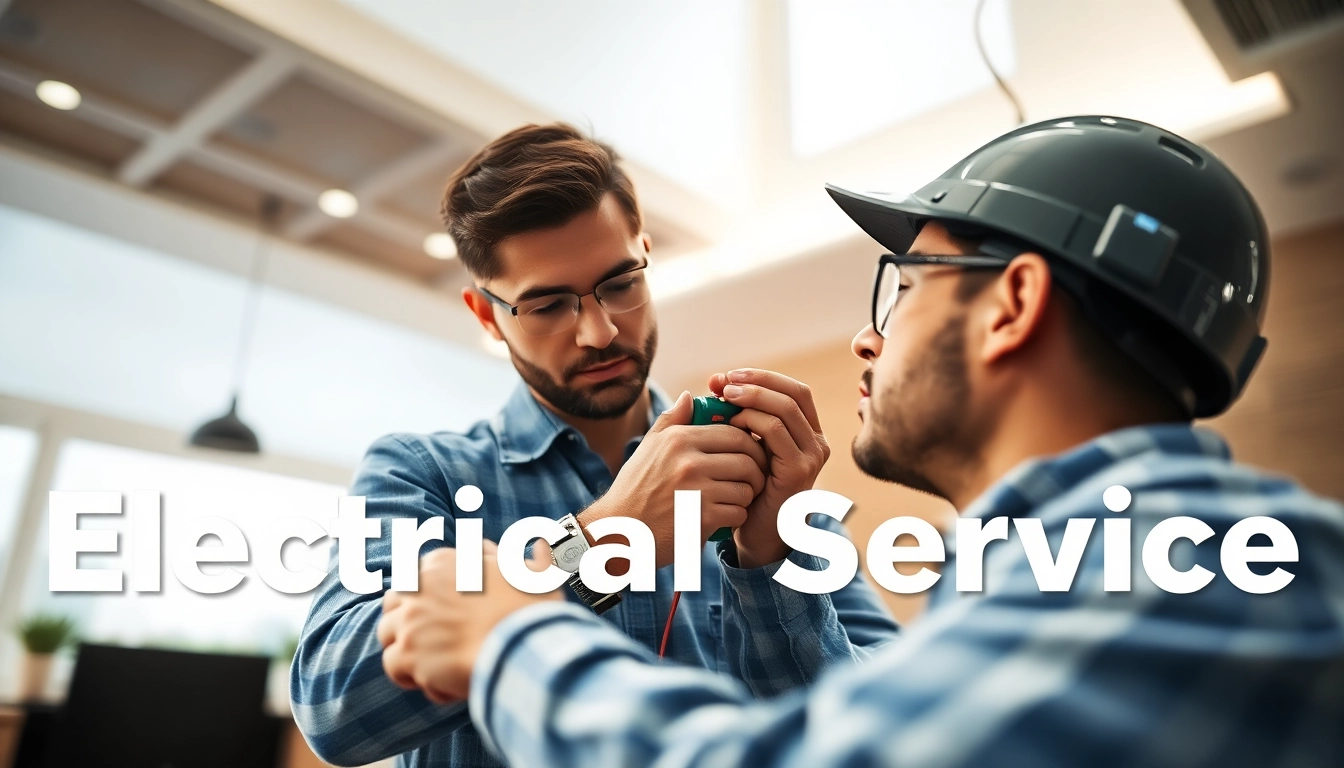Defining the Electrical Contractor Role
What is an Electrical Contractor?
An electrical contractor is a professional entity or individual responsible for the design, installation, maintenance, and repair of electrical systems. These specialists operate in various sectors, including residential, commercial, and industrial environments. Their work encompasses everything from laying wiring in new constructions to ensuring that existing systems are functioning safely and efficiently. In simpler terms, if you need electrical work done, an Electrical Contractor is your go-to resource.
Key Responsibilities of an Electrical Contractor
The responsibilities of an electrical contractor can be extensive. Here are some of the primary duties you can expect:
- Planning and Design: Crafting blueprints and layouts for wiring systems, often in collaboration with architects and engineers.
- Installation: Overseeing the installation of electrical systems, including wiring, lighting, and power supply units.
- Maintenance and Repair: Performing routine inspections and necessary repairs to ensure that systems adhere to legal and safety standards.
- Compliance and Licensing: Ensuring all work is compliant with local codes and regulations while maintaining appropriate licenses and certifications.
Types of Electrical Contractors
Electrical contractors can be categorized into various types depending on their specialization and the markets they serve. Understanding these distinctions can help clients choose the right professional for their projects:
- Residential Contractors: Focus on home electrical systems, including installations, repairs, and upgrades.
- Commercial Contractors: Specialists in electrical installations for businesses, offices, and retail spaces, often dealing with larger projects.
- Industrial Contractors: Handle heavy-duty electrical work in factories, plants, and other industrial settings.
- Low Voltage Contractors: Experts in low-voltage systems such as telecommunications, fiber optics, and security systems.
Essential Services Offered by Electrical Contractors
Residential Electrical Services
Residential electrical services encompass various tasks aimed at improving the electrical systems in homes. These services often include:
- Wiring and Installation: Running new electrical lines for appliances and lighting fixtures, along with circuit installations.
- Electrical Panel Upgrades: Replacing outdated panels to ensure adequate distribution of electricity.
- Lighting Design: Providing tailored lighting solutions to enhance both functionality and aesthetics.
- Emergency Repairs: Immediate responses to electrical failures that pose risks to safety or comfort.
Commercial Electrical Installations
For the commercial sector, electrical contractors handle a variety of services tailored to businesses:
- Installation of Electrical Systems: Setting up complex electrical systems that are integral to business operations.
- Energy Efficiency Solutions: Implementing energy-saving systems that reduce operational costs.
- Fire Alarm and Security Systems: Installing and maintaining systems essential for safeguarding people and property.
- Lighting Solutions: Designing and installing bespoke lighting systems that positively contribute to the workplace environment.
Maintenance and Repair Services
Ongoing maintenance is critical for ensuring safety and performance. Electrical contractors offer services that include:
- Routine Inspections: Comprehensive evaluations to identify potential issues before they become significant problems.
- Code Compliance Checks: Assessing installations to ensure they meet current electrical codes.
- Upgrades and Retrofitting: Modernizing old systems to improve efficiency and performance.
- Emergency Repairs: Quick response services to address unexpected electrical failures requiring immediate action.
Skills and Qualifications of an Electrical Contractor
Necessary Certifications and Licenses
To operate legally, electrical contractors must obtain necessary licenses or certifications, which vary by state. Common credentials include:
- State Licenses: Most states require electricians to be licensed. This generally involves a combination of classroom training and hands-on experience.
- National Electrical Code (NEC) Compliance: Knowledge of the NEC is critical, as it sets the standards for safe electrical installation.
- Specialized Certifications: Additional certifications in various electrical specialties can enhance a contractor’s credentials.
Technical Skills Required
The technical skill set of an electrical contractor is pivotal in executing their roles effectively:
- Circuit Design: Understanding how to design efficient and safe electrical circuits.
- Problem-Solving Skills: Diagnosing issues quickly and accurately to ensure efficient repairs.
- Familiarity with Tools: Proficiency using a range of hand and power tools essential for electrical work.
- Knowledge of Electrical Systems: Broad understanding of varied electrical systems and their regulatory environments.
Soft Skills for Effective Client Interaction
Beyond technical skills, soft skills are equally valuable for successful interactions with clients and team members:
- Communication Skills: Ability to clearly explain technical concepts to clients without technical backgrounds.
- Team Collaboration: Working effectively with architects, engineers, and other contractors to deliver successful projects.
- Time Management: Efficiently managing time to meet deadlines and budgetary constraints.
- Customer Service Orientation: Establishing a good rapport with clients to enhance satisfaction levels and encourage repeat business.
Safety Practices in Electrical Contracting
Understanding Electrical Safety Standards
Safety should always be a priority in any electrical contracting work. Contractors must adhere to strict safety standards to prevent accidents and injuries:
- National Electrical Safety Code (NESC): Familiarity with NESC standards is imperative for ensuring safety during installations and maintenance.
- OSHA Regulations: Compliance with Occupational Safety and Health Administration (OSHA) guidelines protects workers and mitigates risks.
- Regular Safety Training: Investing in ongoing safety training keeps contractors updated on best practices and regulatory changes.
Personal Protective Equipment (PPE) Guidelines
Proper use of PPE minimizes risks associated with electrical work:
- Electrical Gloves: Insulated gloves protect against electrical shocks.
- Hard Hats: Protecting the head from falling objects and accidental impacts.
- Safety Glasses: Guarding against eye injuries from flying debris or sparks.
- Non-conductive Footwear: Reducing the risk of electrical shock by providing insulation.
Emergency Protocols for Electrical Contractors
In the event of an electrical emergency, having protocols in place is crucial:
- Emergency Contact Procedure: Establishing a clear line of communication for reporting and responding to emergencies.
- First Aid Training: Ensuring that personnel are trained to handle electrical injuries or incidents.
- Regular Emergency Drills: Practicing emergency evacuation and response plans enhances preparedness.
Choosing the Right Electrical Contractor
Factors to Consider When Hiring
Selecting the right electrical contractor requires careful consideration of several factors to ensure that the chosen professional meets your needs:
- Experience: Look for contractors with a proven history in similar projects.
- Reputation: Check client reviews and testimonials to gauge reliability and quality of work.
- Insurance and Licensing: Confirm that the contractor holds valid insurance and licenses applicable in your state.
- Cost Estimation: Obtain detailed estimates to understand the budgeting needs for your project.
Questions to Ask an Electrical Contractor
Before finalizing your selection, asking the right questions can provide invaluable insights:
- Can you provide references from past clients? This helps validate their experience and the quality of work.
- What is your approach to safety and compliance? Understanding their safety measures is crucial.
- How closely do you work with other contractors or engineers? Collaboration ensures smoother project execution.
- What is the estimated timeline for completion? Important for coordinating your schedule and expectations.
Evaluating Cost and Service Comparisons
When comparing costs, explore these strategies for making informed decisions:
- Get Multiple Estimates: Gathering quotes from different contractors can help identify a reasonable price range.
- Evaluate Included Services: Ensure that the estimates provide a clear understanding of what services are covered.
- Review Contracts Carefully: Scrutinize terms and conditions to avoid unforeseen expenses later.
- Watch for Red Flags: Inconsistencies in estimates or overly low quotes can indicate possible issues.




